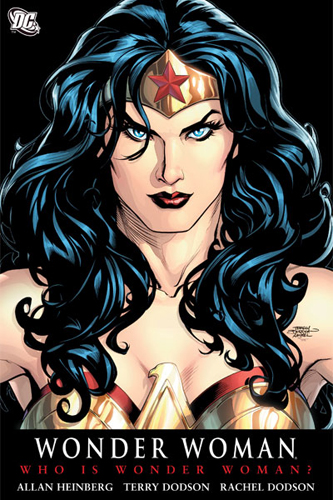 Every so often readers (and writers) comment on problems they have with the comic book character Wonder Woman.
Every so often readers (and writers) comment on problems they have with the comic book character Wonder Woman.
The Amazon princess, Diana, was created in 1941, by William Moulton Marston. On the heels of the appearances of superheroes like Superman and Batman, Marston felt that girls deserved their won role model. His creation was beautiful and strong, and carried the Lasso of Truth. Detecting truth was a matter of interest to Marston, as he invented the polygraph, popularly known as the “lie detector.”
Wonder Woman has a number of contradictions attached to her — she is a warrior and yet she is also an ambassador of peace from the Amazons to “Man’s World.” Try as they might to downplay the incongruity of a warrior society such as that of the Amazons also purporting to be more peaceful than the rest of humanity, writers have been stuck with it. It just will not be shaken off. Recent writers have shown the Amazons as less than perfect in their adherence to peace. Yet, “warrior for peace” remains an element in the character of Princess Diana.
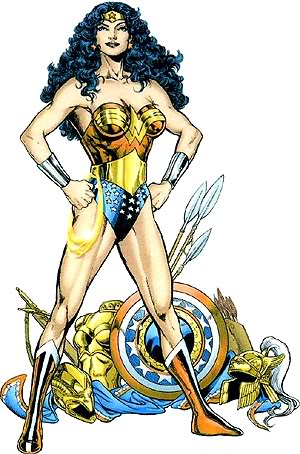
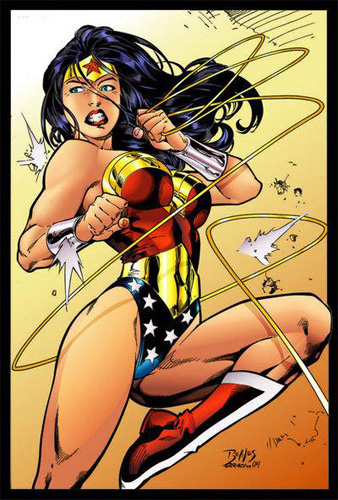 The Lasso of Truth also forces an unusual quality upon the nature of Wonder Woman. By using it, Diana can force a perpetrator to face aspects of his or her own nature that they have been denying. Even if she doesn’t use this power, its presence with her is a constant reminder of what she could do. It bestows a certain implacability to her character.
The Lasso of Truth also forces an unusual quality upon the nature of Wonder Woman. By using it, Diana can force a perpetrator to face aspects of his or her own nature that they have been denying. Even if she doesn’t use this power, its presence with her is a constant reminder of what she could do. It bestows a certain implacability to her character.
Molded in clay by her mother, Queen Hippolyta, given life and powers (strength, flight, and apparently immortality) by the Greek gods, Diana is in her origin somewhat removed from normal humanity. And yet she is not really a goddess (although one writer did have her become the Goddess of Truth for a time).
However it came about, there is something in the nature of Wonder Woman that defies easy pigeon-holing.
She won’t be easily pegged and yet, readers do have a sense when she’s being taken off track, when she is “out of character.” She is caring and merciful, and yet if she goes too far into emotional territory, something feels “off.” She’s passionate about her family and protecting those under her care, but romance inevitably seems unbalanced when brought into proximity with the Amazon princess. (It might be that readers feel she has no peer, so that all possible romantic partners are “beneath” her.)
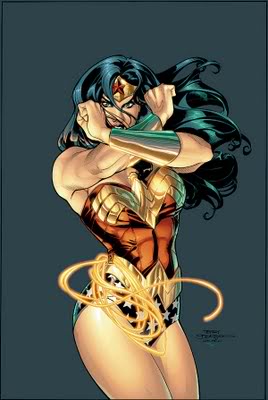 Some of the factors that create this unsettling nature spring from how closely Wonder Woman’s character parallels that of the Greek goddess Nemesis. Nemesis was the daughter of Night, which places her in the realm of the mysterious and unaccountable. We have come to treat nemesis as a negative force, but she wasn’t such originally. She was all about keeping things in proper balance. She made sure virtue was rewarded and injustice was brought to balance. She is, in fact, the figure of Justice we see in courts these days; blind-folded for impartiality (she doesn’t care about your social status), holding both a sword and a balance scale — and she will use that sword to help put the scales in balance. Nemesis is very unsettling — and Wonder Woman, for similar reasons, carries the same effect.
Some of the factors that create this unsettling nature spring from how closely Wonder Woman’s character parallels that of the Greek goddess Nemesis. Nemesis was the daughter of Night, which places her in the realm of the mysterious and unaccountable. We have come to treat nemesis as a negative force, but she wasn’t such originally. She was all about keeping things in proper balance. She made sure virtue was rewarded and injustice was brought to balance. She is, in fact, the figure of Justice we see in courts these days; blind-folded for impartiality (she doesn’t care about your social status), holding both a sword and a balance scale — and she will use that sword to help put the scales in balance. Nemesis is very unsettling — and Wonder Woman, for similar reasons, carries the same effect.
Diana is a “divine hero” — in a community, but not of it, and she brings a boon to society. We are a bit ambivalent as to whether we want to take the whole of her boon: truth and peace require things of us that are hard to give up.
But one of the other crucial elements that figure in the nature of Wonder Woman is that, unlike Nemesis, she is not a figure of Night. By nature, with her openness and her commitment to reason and truth, Wonder Woman fits the dynamics of a solar figure.
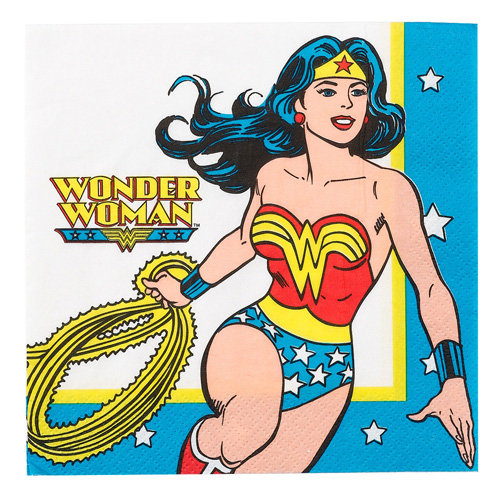 She’s “a babe,” a confident woman, beautiful and bold. And yet, Wonder Woman remains difficult to peg. That is, perhaps, part of her enduring power to fascinate us. We try to sort her out, to figure what makes her tick, because we don’t really want to deal with someone as completely committed to truth and justice as the Amazon princess is. She’s not some wild woman who needs taming, nor some insecure heroine who needs coaching. She is, as she has always been, Wonder Woman and something more than we expect.
She’s “a babe,” a confident woman, beautiful and bold. And yet, Wonder Woman remains difficult to peg. That is, perhaps, part of her enduring power to fascinate us. We try to sort her out, to figure what makes her tick, because we don’t really want to deal with someone as completely committed to truth and justice as the Amazon princess is. She’s not some wild woman who needs taming, nor some insecure heroine who needs coaching. She is, as she has always been, Wonder Woman and something more than we expect.
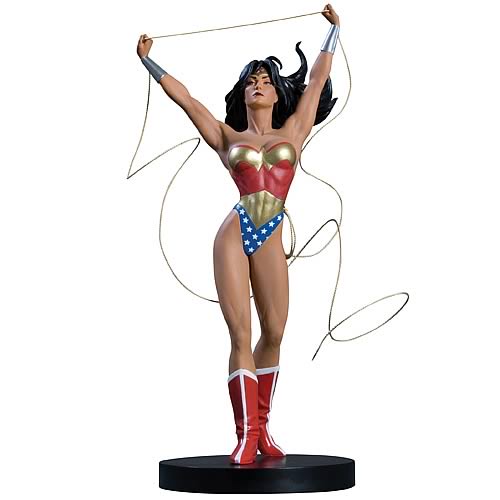
(Wonder Woman images are copyright DC Comics, or their designates; the character is a property of DC Comics.)

I’m becoming a big fan of Diana, simply because so many intelligent women seem to read Wonder Woman comics or write about them.
It’s inspiring.
She is intriguing, that’s for sure.
And welcome to the blog!
S.
Pingback: Girl Comics | A Distant Soil by Colleen Doran
Pingback: Girl Comics | A Distant Soil by Colleen Doran
Pingback: Is the Myth of Wonder Woman a Lie? « Scribbler’s Guide to Myth
I think a lot of these contradictions come from a failure to follow Fitzgerald’s dictum about being able to hold two seeming contradictions in one’s mind at the same time.
Although she shared names with the goddess of the hunt and the moon, Golden Age Wonder Woman seemed most like the goddess Athena, interpreted as the goddess of reluctant warfare and “speaking softly but carrying a big stick”. Like Athena, Princess Diana was a master of arts and crafts, a mentor to the potential heroism locked within mortals, and an enemy of Mars/Ares, interpreted as the god of brutal and gratuitous warfare. Like Athena, she retained absolute authority over her sexuality. Just as Athena had her shield adorned with the head of Medusa that could turn enemies to stone, so Princess Diana had her magic lasso that turned enemies into speakers of the truth.
From the above perspective, the seeming contradiction between seeking peace and having training in war becomes clearly a surface contradiction.
Her creation from clay, with the goddesses breathing life into her, parallels neatly the creation of Adam from clay with God breathing life into him. However, unlike Adam after his error with the fruit of the tree of the knowledge of good and evil, Princess Diana left her paradise voluntarily, specifically to help those who had fallen though she had never fallen herself.
This is one of the reasons why her relationship with Steve Trevor has required a level of skill of which few comic book writers have been capable. Princess Diana has flirted with and teased her male damsel, but particularly in the Golden Age she made it clear that Steve would need to prove himself spiritually and psychologically mature before she would consider a romantic relationship with him. Much of the tales of the Golden Age can be viewed as Steve Trevor’s slow spiritual and psychological growth — something difficult to write, particularly for an action-oriented genre-and-medium such as superhero comic books. Furthermore, poor Steve has been the whipping boy of many anti-feminist writers and critics who can tolerate a female character with a healthy animus but still excoriate and loathe any male character with a healthy anima.
I think the biggest problem Americans have with Wonder Woman is that the character reminds us of the best we can be when it comes to gender, equality, truth, mercy-yet-justice, compassion-yet-strength, but most of our writers have been unequal to the task of writing such a character, and the successes of Moulton and Perez and company just highlight that fact.
Much of my understanding of Wonder Woman comes from reading as much of her Golden Age appearances as I can get my hands on, her time under the brilliant writing of George Perez, and a syncretic (or synthesizing?) approach to her various interpretations in the Justice League. (Oh, and to ignoring what John Byrne did with her and ignoring the DC52 incarnation.)
Oh, I definitely agree that Diana is affiliated with Athena rather than her namesake Artemis/Diana. When I was reading the Wonder Woman comics as a child, I recall she was always calling on Athena for guidence.
I like your insights on the reasons why the Steve Trevor relationship worked originally. It emphasizes why attempts to create other romances for her often come off badly. The writer might try to create a hyper-masculine character to balance her power, and then the character just comes off as brutal (and hence unworthy). I have not kept up with things the last couple of years (an economic hindrence, although I was not keen on what I saw of the beginning of the DC52 incarnation).
Thanks for your observations though! Some interesting food for thought!
Well, on a personal level, I do not think we will be able truly to transcend our sexist, gender-segregationalist past until we embrace and even celebrate the masculinity of men who are able to operate from the anima and not merely the animus.
We need also for men and women to celebrate men who can channel the receptivity, quiet courage, and compassion-orientation of the anima. Right now, much of popular literature, film, and television still mocks the nurturing male and/or treats the man who needs a woman’s help as “damaged goods”. Even now, in 2013, we have advertisements featuring “sexy girls” who pout at the camera in a sultry whisper, “I want a *real* man”, with the clear implication that a “real man” is a man thoroughly and proudly out of touch with his anima.
So long as men and women allow pop culture and advertisements to define a “real man” as a man alienated from his own anima, there will be an inevitable concomitant assumption that women earn access “real men” only by engineering female alienation from the animus.
It is not enough for men and women to celebrate empowered women who can channel the assertiveness, forcefulness, and activity-orientation of their animus. A world with fully healthy women but unhealthy men is not a world with gender equity and equality. When men are burdened with handling the animus for both men and women, women become burdened with handling the anima for both men and women.
I would say that, on TV at least, the character of Rick Castle meets your requirements. Although they play a lot with his being a mere civilian, and not trained for the true cop stuff, time and again he delivers on the action stuff (typically regarded as “masculine”) when the chips are down. Yet most of the time it is his anima that is visible: concerned parenting, encouraging and assisting his partner, manifesting the emotional side of things. The characters of Castle and Beckett are well balanced, I think.
So, some changes are edging into popular entertainment. But we need more, it’s true.